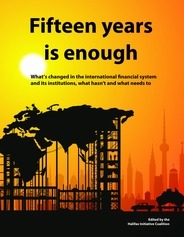Monthly Issue Update - February 28, 2011
ODA accountability consultation; World Bank dumps human rights; Bank report on extractives ignores reality.
ODA accountability consultation; World Bank dumps human rights; Bank report on extractives ignores reality.
Submission by the Halifax Initiative and CCIC regarding implementation of the Official Development Assistance Accountability Act.
AUGUST 27, 2010
General Observations
The undersigned civil society organizations believe the latest drafts of the Sustainability Policy, Performance Standards, and Disclosure Policy respond usefully to some issues raised previously by many civil society organizations, including, for example, several issues related to gender, resettlement, and climate change. Many of our most significant concerns, however, remain unaddressed, including centrally important issues related to due diligence, transparency, and accountability, and other issues related to substantive concerns.
Bridge to South KoreaHeld in Toronto, on Monday and Tuesday, June 21-22, 2010, just ahead of the G8 Summit in Huntsville and the G20 Summit in Toronto, this meeting was intended as a strategy session for civil society organizations, platforms and networks from many G20 countries (and beyond) to discuss diverse perspectives on both the G20 as an institution and priorities with respect to its agenda. As the outcome of an initial G20 strategy meeting in Washington DC in April of 2010 among various groups, the intention of this broader meeting of national, regional and international networks was three-fold:
|
MEETING DETAILS
|
Bridge to South KoreaHeld in Toronto, on Monday and Tuesday, June 21-22, 2010, just ahead of the G8 Summit in Huntsville and the G20 Summit in Toronto, this meeting was intended as a strategy session for civil society organizations, platforms and networks from many G20 countries (and beyond) to discuss diverse perspectives on both the G20 as an institution and priorities with respect to its agenda. As the outcome of an initial G20 strategy meeting in Washington DC in April of 2010 among various groups, the intention of this broader meeting of national, regional and international networks was three-fold:
|
MEETING DETAILS
|
 What’s changed in the international financial system and its institutions, what hasn’t and what needs to
What’s changed in the international financial system and its institutions, what hasn’t and what needs toExecutive Summary
Back in 1995, the G7 met in Halifax during a “time of change and opportunity.” The meeting took place in a context of mounting deficits and debt crises in countries in the South; in the wake of economic collapse in Mexico; and amid strong global criticism from civil society, the media and governments about the World Bank and International Monetary Fund’s (IMF) austere neo-liberal structural adjustment policies.
A lot has changed since then, partly in response to the Halifax G7 Summit and subsequent G7 and G8 meetings. Too many of these improvements, however, exist only on paper. Beyond the surface, the neo-liberal, market-oriented bias that guides the Bank and Fund’s agenda and thinking has not altered.
The 2010 G8 Summit in Toronto in 2010 takes place during another “time of change and opportunity.” The financial crisis has spurred many civil society organizations (CSOs) to insist on far-reaching changes to the global financial system and its institutions. Clearly, as this publication will illustrate, 15 years of refusing to deal with the manifest shortcomings of the global economic system is enough.
Commenting on The Social and Environmental Sustainability Policy, Performance Standards and Disclosure Policy
Introduction
The undersigned civil society organizations have prepared this joint submission to provide an overview of many of our concerns related to IFC’s Policy on Social and Environmental Sustainability, the Performance Standards, related guidance documents, and the Disclosure Policy. We believe these concerns should be explored and addressed further through IFC’s current consultation and review process.
Rethinking the international financial system during a time of crisis
Introduction
On October 19 and 20, 2009, the Halifax Initiative held a conference, co-hosted by The North South Institute, the University of Ottawa and the School of International Development and Global Studies (SIDGS), entitled "What’s Missing in the Response to the Global Financial Crisis?" The meeting brought together experts from a range of backgrounds to analyze the challenges facing the global economy, discuss the ways in which the international community has responded to the current financial crisis, and identify shortcomings in these responses.
Governance and institution - Global economic governance in crisis: new players, new power
Moderator: Gordon Betcherman, Professor, School of International Development and Global Studies, University of Ottawa
Rules and policies - Raising and retaining funds
Moderator: Teresa Healy, Senior Researcher, Social and Economic Policy
Department, Canadian Labour Congress